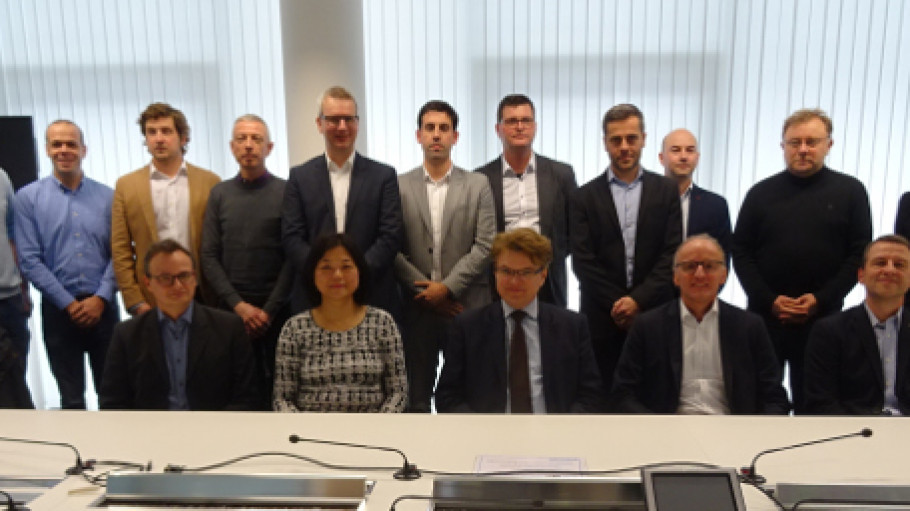
Press releases » Quality Tracking System for steel coils project comes to a successful conclusion
Quality Tracking System for steel coils project comes to a successful conclusion
Recent updates

Brussels, 23 January 2019 – The Quality Tracking System for steel coils project governed by the European Steel Association (EUROFER) closed today after three successful years of development and deployment. The project has contributed to the further digitalisation of the sector and has helped support the ambition to achieve the ‘zero defect vision’ for users of flat steel products.
Axel Eggert, Director General of EUROFER said, “The Quality Tracking System, developed by a consortium of our members, with EUROFER acting as the governance body, helps increase the overall resource efficiency of the steel supply chain. The initial objectives of the project have been achieved after three years of close cooperation between all stakeholders”.
Flat steel products, such as sheets, are often delivered to customers as coils. Coils are easier to transport as several hundred metres of steel can be shipped in a relatively compact load. However, steel coils can have isolated quality issues – imperfections – at points along their length. These isolated flaws can disrupt customers’ processes as finished parts containing the imperfections may be rejected during quality control.
To solve this problem, the Quality Tracking System uses unique ‘1D’ bar codes printed automatically along the coil at regular intervals - typically every meter. The quality information, when synchronised with the bar code, provides the position of a flaw. This data, whose content is standardised, allows steel users to avoid that part of the coil during their processes. This means a user can automatically reject a section of steel on the blanking or stamping line.
The Quality Tracking System has been submitted to the European standards body, CEN, with publication of the European standard expected at some point in 2019.
EUROFER became the governance body for the project in February 2016. The steering committee was composed of ArcelorMittal, Tata Steel Europe, thyssenkrupp Steel Europe, voestalpine Stahl and Salzgitter Flachstahl.
“The use of unique ‘1D’ barcodes printed automatically along the coil to identify each section of steel is highly innovative and the five founding members of the project are now equipped with the system. Having a common technical solution enables steel users to work with all steel suppliers in the same way”, emphasised Mr Eggert.
The project’s closing event took place at the EUROFER offices on 23 January 2019 with the support of the founding companies, as well as that of SSAB, Plexant, Octum and Fagor, who have been ordinary members of the project.
Contact
Charles de Lusignan, Spokesperson and head of communications, +32 2 738 79 35, (charles@eurofer.be)
About the Quality Tracking Project
To create a common language and facilitate the use of the Quality Tracking System, a European standardisation process has been launched within CEN/TC 459 “ECISS”/SC09. The draft standard went through CENCIB in December 2018 and next step is CEN Enquiry.
The publication of the European standard is expected in 2019.
EUROFER continues to coordinate some common work such as the 1D bar code governance. The contact person is Danny Croon (d.croon@eurofer.be)
About the European Steel Association (EUROFER)
EUROFER AISBL is located in Brussels and was founded in 1976. It represents the entirety of steel production in the European Union. EUROFER members are steel companies and national steel federations throughout the EU. The major steel companies and national steel federations in Switzerland and Turkey are associate members.
About the European steel industry
The European steel industry is a world leader in innovation and environmental sustainability. It has a turnover of around €170 billion and directly employs 330,000 highly-skilled people, producing on average 160 million tonnes of steel per year. More than 500 steel production sites across 22 EU Member States provide direct and indirect employment to millions more European citizens. Closely integrated with Europe’s manufacturing and construction industries, steel is the backbone for development, growth and employment in Europe.
Steel is the most versatile industrial material in the world. The thousands of different grades and types of steel developed by the industry make the modern world possible. Steel is 100% recyclable and therefore is a fundamental part of the circular economy. As a basic engineering material, steel is also an essential factor in the development and deployment of innovative, CO2-mitigating technologies, improving resource efficiency and fostering sustainable development in Europe.
Brussels, 26 February 2026 — Europe’s steel industry has warned that the current draft Industrial Accelerator Act could direct public support for low-carbon steel to producers outside the European Union, unless lawmakers include and tighten ‘Made in Europe’ provisions.
Brussels, 24 February 2026 - Europe’s energy-intensive industries have set out a series of proposals to ensure that the EU’s upcoming Electrification Action Plan delivers on its objectives to stimulate and boost electricity consumption in industry. In a joint position paper, industries warn that persistently high electricity prices risk undermining industrial competitiveness and decarbonisation efforts. They call for a policy framework that will enable EU industry in pursuing decarbonisation and industrial competitiveness.
Energy-intensive industries (EIIs) provide direct employment to around 2.6 million people in the EU and represent the foundations of critical and strategic value chains for the EU economy and society. The current economic and energy outlook of the European Union is making investments in electrification and the continued business operation of our sectors at serious risk, should the energy-cost challenge not be solved.